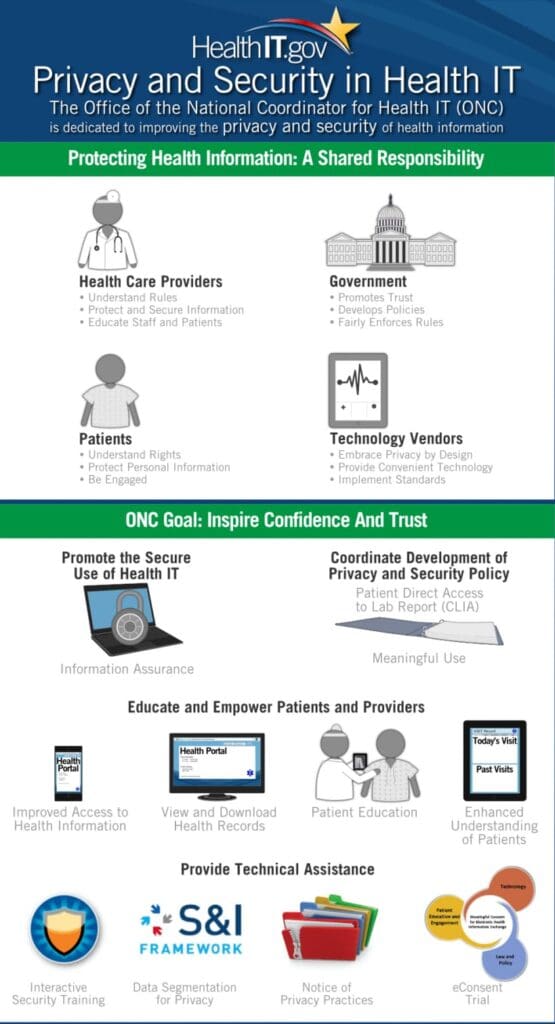Healthcare has become more interconnected than ever, making it important to protect patients’ sensitive information. The Health Insurance Portability and Accountability Act (HIPAA) ensures individuals’ health data protection and privacy. The HIPAA was introduced in 1996, and its main goal is to ensure healthcare providers keep their patient’s information private while still using it to provide exceptional medical services.
HIPAA is so important because information can spread faster than ever in today’s digital age. There are severe consequences if someone breaks the rules listed in the HIPAA. Everyone involved in healthcare must understand and adhere to HIPAA rules. This includes insurance companies, nurses, and doctors. By following the HIPAA, patients and healthcare providers understand there is a bond of trust that makes sure personal information will stay safe.
In this article, we’ll talk more about the HIPAA, the importance of compliance, some common HIPAA violations, and more!
Understanding What is HIPAA
The entire goal of the HIPAA is to make sure that healthcare providers, insurers, and everyone else handling sensitive patient data do it the right way. It’s all about creating the perfect balance between optimal medical services while upholding patient privacy.
The HIPAA gives healthcare organizations a guideline for using and sharing patient information. The guidelines ensure that patient information is safe from unauthorized access and sharing. Some of the data that it covers are:
- Electronic health records
- Billing details
- Health insurance information
The Importance of Compliance
There are severe consequences to not abiding by the HIPAA rules. Healthcare organizations can face steep penalties and serious damage to their reputation if they don’t meet the HIPAA’s requirements. Other penalties include legal and criminal charges, depending on how bad the violation is.
A healthcare agency that violates the HIPAA causes patients to lose trust in them. Patients expect their health information to be kept safe and secure, and a breach of that trust can instantly cause a patient to look down upon the agency that violates it.
List of Most Common Entities to Violate HIPAA Violations
There are a variety of common covered entities where HIPAA violations that occur. Some of the more common ones include:
- General hospitals
- Private practices and physicians
- Pharmacies
- Outpatient facilities
- Community health centers
When patient records aren’t handled properly, are accessed by unauthorized personnel, or when security measures aren’t in place to protect patient files, it’s considered a violation of the HIPAA.
Since 2003, there have been over 331,100 complaints that were handled by the Office for Civil Rights. The most commonly alleged compliance issues included improper use and disclosure of health information, inadequate safeguards, limited patient access to their information, and excessive use or disclosure of patient health data.
What are the Most Common HIPAA Violations?
As you can see from the statistic above, HIPAA violations happen more than you think. By now, you might be wondering a few questions:
- What is considered a HIPAA violation?
- What happens if you violate HIPAA?
Let’s take a closer look at some of the most common HIPAA violations to give you a better understanding.
1. Unauthorized Access or Disclosure of Protected Health Information
One of the most common HIPAA violations is unauthorized access or disclosure of protected health information. HIPAA requires healthcare organizations to be careful with patients’ private health information. They’re also able to track who access or shares that information. If a patient asks for a disclosure of when their private health information has been accessed, healthcare organizations must provide it.
For example, imagine a hospital employee accidentally shares a patient’s medical records with someone who shouldn’t have seen them. This breach of privacy could harm the patient and cause consequences for the hospital.
To prevent something like this from happening, it always helps to check the access logs and exercise control over who can view sensitive information like this. Limiting access to only authorized personnel will help keep patient data safe and ensure HIPAA rules are followed.
2. Lack of Adequate Security Measures
The HIPAA has a requirement that healthcare organizations take strong steps to protect electronic health information. There need to be safeguards in place to keep patient data safe from unauthorized access.
For example, if a hospital’s computer system isn’t regularly updated, it can be more vulnerable to security and cyber attacks. Hackers can access sensitive patient records and this is a huge breach of HIPAA rules.
To avoid something like this from happening, computer systems need to be regularly updated and patched to ensure their security against threats. Strong encryption methods for data should be used, and multi-factor authentication will add even another layer of security. This method requires more than just a password to access sensitive data.
3. Failure to Conduct Regular Risk Assessments
Regular risk assessments are important in protecting health information under the HIPAA. With ongoing assessments, healthcare organizations will better understand the weaknesses in their data protection measures. With periodic risk assessments, organizations will detect areas where patient information may be at risk before a breach occurs. For example, an assessment can uncover things like:
- Outdated security protocols
- Weak access controls
- Inadequate encryption methods
Some helpful advice to remember here is that risk assessments should become a routine part of your security protocols. It’s always recommended to run these assessments before issues arise. Every so often, healthcare organizations should update their security measures, use stronger access controls, provide staff training on the best security practices, or even consider using newer technology to strengthen data protection.
4. Improper Disposal of Patient Health Information and Records
The HIPAA also states that healthcare organizations are responsible for ensuring patient health information is disposed of properly to maintain full confidentiality. Patient health information must be unreadable and impossible to reconstruct when the information is no longer needed.
Let’s take a look at a scenario. Imaging a medical clinic is disposing of patient records by just tossing them in the nearby trash can without doing anything further. Anyone in the clinic could go and pick up the trash and look at the information. This breach of proper disposal violates HIPAA and could cause patient harm.
To prevent something like this from happening, it’s highly recommended to use secure medical record disposal methods for paper and electronic records. If a clinic is mostly based on paper records, shredding is a commonly used technique to destroy the records. For electronic records, formatting is a way to destroy the records.
What are the Best Practices to Avoid HIPAA Violations?
No one wants to deal with HIPAA violations. Following the best practices will ensure patient information is protected and compliance standards are being met.

Implementing Robust Security Measures
Protecting patient health information is extremely important, and good security measures are exactly what helps a healthcare organization achieve this goal. Encryption will encode data to prevent unauthorized access, and security access controls will limit who can view and handle sensitive information.
Some other security measures include secure email using firewalls and intrusion detection, policies for securing mobile devices with access to patient health information, and ongoing monitoring of electronic media and hardware with patient health in formation on it.
Regular Risk Assessments
It’s important to conduct routine risk assessments to prevent potential HIPAA violations. Risk assessments help healthcare organizations get a better idea of vulnerabilities and weaknesses in data protection. Using these risk assessments, they can become proactive in addressing the risks.
Staff Training
All staff that deal with patient health information need to be trained on HIPAA rules. Educating employees about patient privacy, secure data practices, storing paper medical archives, and following the HIPAA guidelines will ensure that healthcare organizations won’t face penalties and fines later down the road. One recommendation here is to make HIPAA training mandatory for new hires. Periodic refresher training sessions, at least once a year, are also helping to reinforce how important compliance is to these procedures.
Taking Steps to Avoid HIPAA Violations with Armstrong
As you can see, understanding and complying with HIPAA rules are important for keeping patients’ health information protected. Following the guidelines set out in the HIPPA will help you avoid violations, fines, and penalties. Robust security measures, comprehensive staff training, and regular risk assessments ensure a healthcare organization will be one step closer to maintaining compliance with HIPAA regulations.
If you run an organization having trouble abiding by the HIPAA guidelines, take proactive steps with Armstrong’s HIPAA-compliant services. At Armstrong Archives, we’re well aware of the HIPAA guidelines, and we’ll make it easy for you to comply with all the required regulations to protect patient data.







